- Blind Faith UK (Polydor 583059) August 1969 (1)
- Blind Faith USA (ATCO Atlantic SD 33-304) August 1969 (1)
Steve Winwood's "million-dollar time bomb"
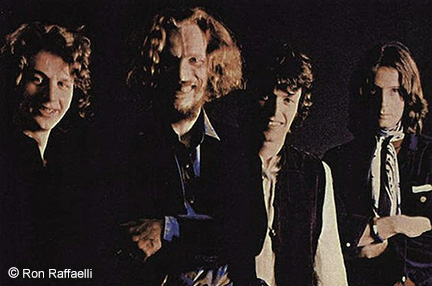
Revised August, 2020
It was fifty years ago when Birmingham's own multi-talented Steve Winwood formed a "supergroup" that soon threatened to collapse under the staggering weight of expectations placed upon them. Although only twenty one years old at the time, Steve was already a seasoned pro in pop music terms having fronted two brilliant and successful bands.
Steve or "Stevie" had previously found fame at the young age of only fifteen in The Spencer Davis Group with whom he recorded several hit records during the mid 1960s that included 'Keep On Running', 'Gimme Some Lovin' and 'I'm A Man'. He left this band in 1967 at the height of their success to form Traffic, a line-up promoted by Island Records founder Chris Blackwell to compete with new psychedelic-sounding groups that were taking over the record charts at the time.
"We feel today's scene is moving very much away from permanent groups"
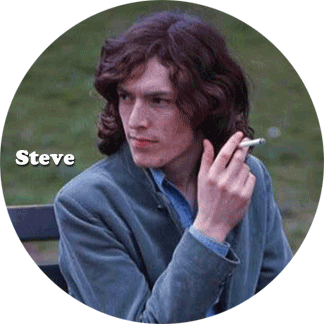
While Traffic enjoyed significant "pop" hits in Britain like 'Paper Sun' and 'Hole In My Shoe' during the so called "Summer of Love", it was their album sales and considerable success in America that was to eventually establish them as major artists on the international music scene. However, in a move that seemed similar with his previous band, Steve Winwood left Traffic at what looked to be the height of their success to embark on a supposed solo career that many had anticipated (or expected) for some time.
Steve said; "We feel today's scene is moving very much away from permanent groups and more towards recognition for individual musicians". This attitude may have developed as a result of Traffic's own living and rehearsal space at an isolated cottage in Berkshire that was frequented by other famous musicians and friends who dropped in for a visit. Along with playing and listening to records, the "jamming" that went on there both inside and outside the house along with no noise restrictions, often extended late into the night and early morning hours.
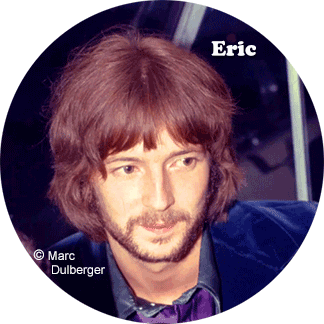
One of the visitors to the Traffic cottage was Eric Clapton who had gained his celebrated reputation as one of the world's best electric guitarists during the time he played in "The Yardbirds" and "John Mayall's Blues Breakers". Eric's latest group "Cream" with drummer Ginger Baker and bass guitarist/vocalist Jack Bruce had just disbanded following two years of constant touring and recording four multi-million selling albums.
While Cream was an internationally successful and highly influential band who pushed the boundaries of guitar-based rock, there was much internal strife. This was mainly between Jack Bruce and Ginger Baker whose long-running conflict dated back to their early jazz/blues days performing with "The Graham Bond Organization" in the pubs and clubs of London's developing blues scene. Their fighting both off (and on) stage was a factor in Cream splitting along with Eric Clapton's desire to find a break from the spotlight and demands of the music business.
"I wanted no part of Cream again but didn't have the heart to say no to Ginger"
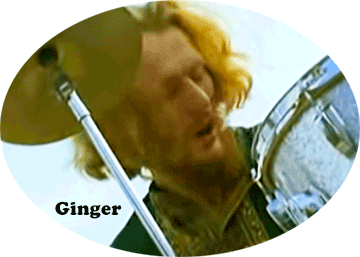
At this time, Eric Clapton was heavily influenced by Bob Dylan and his legendary backing group known as "The Band". This group had recently recorded a diverse album titled "Music from Big Pink" which Eric had been playing to friends. The Band consisted of mostly Canadian musicians - all very talented with a love of North American folk, rock, country and blues music.
Eric Clapton had known Steve Winwood for some time and had even considered bringing him into the Cream line-up to fill out their sound and help ease the tensions between the group members. Now in the relative privacy of Traffic's cottage, Steve was eager to "jam" with Eric which they did (along with other indulgences) until one day, there was a knock on Eric's door by none other than Ginger Baker who had found out what was going on and turned up to join in the fun!
Ginger Baker said; "We got to Steve's cottage in the middle of a field, and I settled down at Jim Capaldi's drum kit and we just played for hours. Musically, Stevie and I got along wonderfully. He's one of the greatest musicians I've ever worked with."
Despite initial misgivings by Eric Clapton who said; "I wanted no part of Cream again but didn't have the heart to say no to Ginger", the three musicians played together and by all accounts, things went incredibly well. Eric had written a deeply personal song titled 'Presence Of The Lord' that Steve was particularly keen on, to which he added a few compositions of his own including the now-classic 'Can't Find My Way Home'.
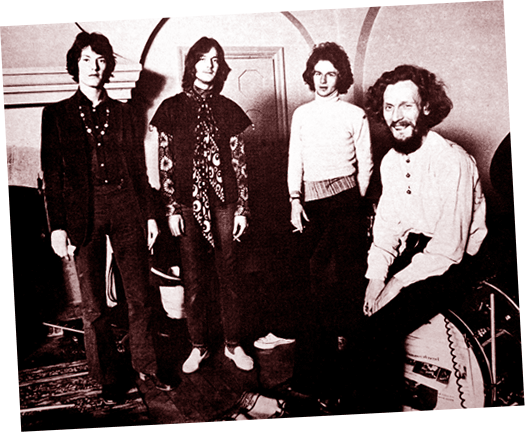
It was only a matter of time before the music press found out about what was going on and the rumours started to spread and multiply. Eric Clapton told journalist Chris Welch; "As far as Steve Winwood, Ginger Baker, and myself are concerned, we are just jamming and have no definite plans for the future."
By February 1969, rehearsals for the yet-unnamed group were transferred to Eric Clapton's recently purchased country mansion "Hurtwood Edge" in Surrey where there was more room and greater security. It was decided the new group would be jointly managed by Island Records boss Chris Blackwell and Eric's manager Robert Stigwood. They reportedly hated each other but formed an uneasy alliance with the aim of exploiting this considerable financial opportunity.
"We just wanted to play music... but I hardly knew what was happening"
To take pressure off Steve Winwood who was doubling up playing both keyboards and bass pedals (in addition to vocals), it was decided to bring in a dedicated bass player in the form of Richard (Ric) Grech whom Eric had first met during his Blues Breakers days when Ric was in a group called "The Farinas". They had evolved into an up-and-coming progressive band called "Family" whose critically acclaimed debut album titled "Music in a Doll's House" had been produced by Traffic's Dave Mason.
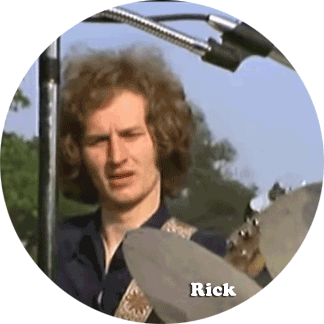
Although Ric Grech came from relative obscurity in comparison to the other three, he was no slouch musically. Able to read music and classically trained on the violin from an early age, he later took up guitar and then bass which became his main instrument after joining The Farinas in 1965. Obviously jumping at this opportunity, Ric left his "Family" during their American tour to the dismay of fellow band-mates.
Steve Winwood and Traffic drummer Jim Capaldi had also played with Ric Grech on Gordon Jackson's ill-fated solo album titled "Thinking Back". This was also produced by Dave Mason who along with Jim and Gordon had recorded some singles during the early 1960s as part of a West Midlands based pop group called The Hellions. The Hellions evolved into Deep Feeling when Dave Mason left. Gordon Jackson's LP, with the added participation of Steve Winwood and Chris Wood, has become known as something of a lost "Traffic" album.
The still un-named group of Steve Winwood, Eric Clapton, Ginger Baker, and Ric Grech started recording sessions in London at Morgan Recording Studio in Willesden, and later at Olympic Studios in Barnes with initially Chris Blackwell and then Jimmy Miller producing. This was done under cover of being an "Eric Clapton solo album" with Steve Winwood helping out but by May of 1969, the truth was out and the word "supergroup" was echoed increasingly by rock fans everywhere.
The first recordings at Willesden did not go well under Chris Blackwell. The group members (along with their entourage) grew restless - mainly due to the long amount of time it was taking to set things up. Eventually, Denny Laine who was also there, grabbed a guitar and started playing resulting in the others joining in. Ginger Baker said; "We all started playing along with him, and he completely lifted the mood".
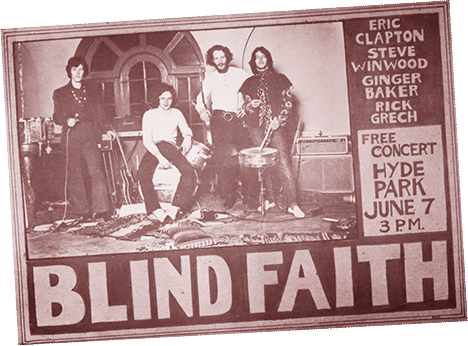
Ginger Baker was furious to discover this "jam" was not recorded and upon grabbing a microphone, screamed a torrent of abuse at Chris Blackwell which according to those who were there, lasted several minutes and caused many to leave in shock and fear! The sessions under Jimmy Miller went much better although Steve Winwood recalled; "They were full of people hanging out. Eric had a lot of bohemian friends and liked to record with people around."
With increasing pressure to come up with a name, "Blind Faith" was selected in time to advertise the group's first concert to be performed to the public for FREE in the open air at London's Hyde Park in a blaze of publicity for June 7th. The line-up felt barely ready to perform in front of a large audience but the arrangements went ahead anyway. Steve Winwood would later say; "We were handled wrongly - sold as a product, and people were hip to see that. We just wanted to play music... but I hardly knew what was happening."
The famous Blind Faith free concert on June 7th 1969 also included show openers Richie Havens (soon to become a star playing the legendary American "Woodstock" festival), and "Edgar Broughton and The Third Ear Band". Pop star Donovan showed up unannounced and performed a short set with his acoustic guitar that went almost unheard. An estimated 120,000 people gathered to this event permeated by the smell of incense and pot smoke on that warm Saturday afternoon in Hyde Park. By the time Blind Faith went on, the assembled crowd were either passively mellow, or increasingly impatient to let go.
"I wasn't really there. I had zoned out"
Blind Faith's laid back performance took most of those present by surprise. There was no sign of the extended instrumental jamming that featured in so many of Cream's live performances. The volume remained relatively low while throughout the concert, Eric Clapton seemed almost afraid to steal the spotlight from Steve Winwood. Although playing flawlessly on a modified Fender Telecaster guitar (with a Stratocaster neck), he remained strangely subdued, almost as if in a strictly supporting role.
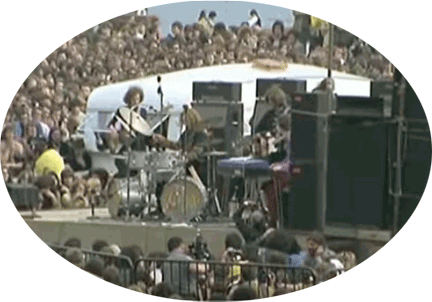
Steve as usual, gave a fine and spirited vocal performance, handling all the vocals while expertly alternating between his trusty Hammond organ and electric piano. The grinning Ginger Baker gained much applause for his Ludwig double-bass drum solo performance in his own composition 'Do What You Like', and Ric Grech seemed totally engrossed in playing his Fender "Jazz" bass guitar while also maintaining a low profile.
"They played together tastefully, almost gently, in contrast to the violence of Cream" read their review in Melody Maker. A rather frustrated Ginger Baker later said he was waiting for Eric Clapton to "let go" but it never happened. Ginger recalled; "He'd been doing amazing stuff in rehearsal and recording, but in Hyde Park I kept wondering when he was going to start playing." Eric himself later said; "I wasn't really there. I had zoned out."
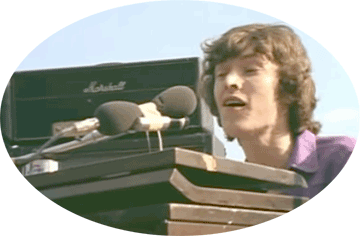
Despite a shortage of original material, the group performed no "Cream" or "Traffic" songs at Hyde Park. Instead, they padded out the set by playing their own arrangements of American blues musician Sam Myers 'Sleeping In The Ground', and Buddy Holly's 'Well All Right' (that was included on the Blind Faith album), along with the Jagger/Richards composition 'Under My Thumb' by the Rolling Stones.
Significantly, Blind Faith's Hyde Park performance was only a month before The Rolling Stones free concert at that same location intended as a memorial to Brian Jones who died on July 3, 1969 and the introduction to his replacement Mick Taylor. Sadly, there were to be more famous casualties in rock music during the next few years.
The cover art for the highly-anticipated "Blind Faith" album issued in August was a colour picture by American rock photographer Bob Seidemann who had taken portraits of The Grateful Dead and Janice Joplin among others. The photo was of a red-haired eleven year old female model, shown naked from the waist up and holding what looked like a chrome plated model airplane or space ship. There was nothing on the album cover to indicate the group's name or members!
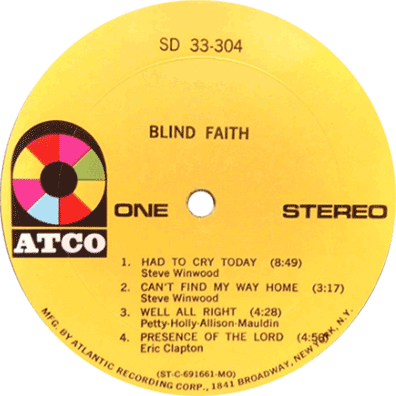
Amazingly, this cover caused little concern when issued in the UK at the time. However, in the USA it was a different story. The major record retailers refused to stock the album and so the cover there was changed to a black and white shot of the band members with their names printed below. This critically acclaimed album quickly sold over a million copies, going to Number One on both sides of the Atlantic.
Blind Faith departed for a few warm-up shows in Scandinavia that were followed by seven weeks of touring in the USA where they performed sold-out shows at large sports stadiums. There were riots near the stage at some of these venues and so security was stepped-up involving increasing numbers of heavy-handed guards and police - some of whom made little distinction between the audience and the performers.
Along with their young supporting band "Free" and the American group "Delaney & Bonnie", the Blind Faith tour went on to face the ever more critical reviews of the music press. Demands from the audience and a shortage of original songs forced the group to include numbers by Cream and Traffic - something Eric Clapton had hoped to avoid. Additionally, while Ginger Baker and Ric Grech got happily stoned together, Steve Winwood felt increasingly isolated and alone.
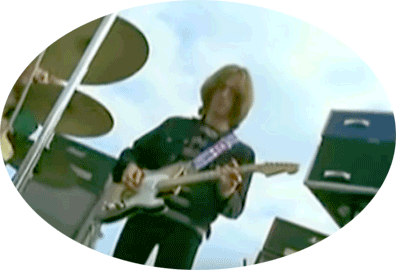
While also descending into a period of substance abuse, Eric Clapton was spending less time with his band-mates and more with their supporting act Delaney & Bonnie. This extended to the point of travelling with them and their band on their tour bus and even joining them on-stage at some of the shows. He envied their relative anonymity while feeling increasing pressure to live up to his own image created by fans and critics. By the time the American tour was over, Eric Clapton decided he'd had enough.
Upon their return to the UK, Ric Grech exclaimed in an interview with Beat Instrumental magazine; "The band has got better and better. As long as we swing happily together, we'll stay together!" By this time however, any future plans for Blind Faith were put permanently on hold.
"Can't find my way home"
Eric Clapton was to be tempted away by the husband and wife duo Delaney and Bonnie Bramlett whose mellow country/blues and soul sounds along with peaceful hippie vibes, belied the brutal wife-beating relationship they had off-stage as Eric later discovered. Ginger Baker went on to form another supergroup called "Air Force" which at one time included both Ric Grech and Steve Winwood (as well as Birmingham's own Denny Laine) before Ginger's well-documented downward spiral fuelled by heroin addiction.
Also dogged by drugs, Ric Grech went on to perform with other famous musicians including Ginger Baker's ill-fated band Air Force and later the re-formed Traffic along with Steve Winwood. Ric played on their acclaimed album "The Low Spark of High Heeled Boys". Despite this, he gave up his music career in the late 1970s and reportedly became a carpet salesman in his home town of Leicester. Ric Grech died in 1990 from the effects of drug and alcohol addiction at the age of 43.
Steve Winwood of course, went on to make a long and successful career in music - a profession he still enjoys to this day. Steve and Eric Clapton remained friends and re-united in 2008 for a series of acclaimed concerts at Madison Square Gardens in New York where they performed music together from their long careers including Blind Faith songs. In Steve's own words; "Blind Faith were not so much of a band as a million dollar time-bomb!"
Copyright © John R Woodhouse
Sources: 'The Harmony Illustrated Encyclopedia of Rock' published in 1982; 'Back In The High Life - a biography of Steve Winwood' book by Alan Clayson published in 1988; 'Slowhand - The Life and Music of Eric Clapton' book by Philip Norman published in 2018; 'Born Under a Bad Sign' Mojo Magazine feature by Johnny Black; 'Eric Clapton and Steve Winwood Live from Madison Square Garden' DVD interviews 2009 Warner Music.
Blind Faith 1960s Record Releases
(highest chart position in brackets)
Album:
If you have comments about this page, please e-mail john@brumbeat.net